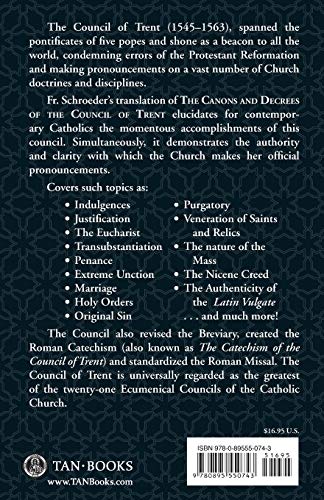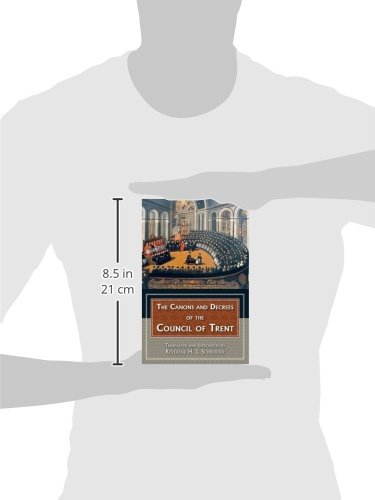Customer Services
Copyright © 2025 Desertcart Holdings Limited




The Canons and Decrees of the Council Of Trent
J**I
Valuable reference for students of Church history and doctrinal development
This is the first complete translation of the documents of the Council of Trent (1545-1563) including the bulls of convocation, the opening and closing addresses to the Council Fathers, the documents of deliberation and the canons of the council. Dominican Father J. J. Schroeder began this work in the 1930s after completing a volume of translation of the decrees of all the ecumenical councils, but reserved the documents of the Council of Trent to one volume because of the sheer volume of the deliberations and definitions. This he published in 1941 with the complete Latin text as well as the English translation. The 1978 edition by TAN publisher only reports the English translation of 1941.As far as this TAN edition is concerned, the publication data is 1978, but the edition that I have is obviously a reprint. I say obvious, for the book contains some elements that are post-2000 such as the 13-ISBN number and the bar-code. Unfortunately, TAN does not provide us with reprint information; it is Amazon that lets us know that the book was reprinted in 2009.The text is fully annotated with Shroeder's critical apparatus. Footnotes are made in keeping with earlier editions of Denzinger, for example, rather than with the updated versions now available. What is especially helpful in the book is a thorough index of terms and persons given at the end of the volume in 15 pages.Just a word on that translation. Some terminology changed between 1941 and 1978. For instance, it was common among English-speaking Catholics to speak of the "Holy Ghost" in the 1940s, but by the 1970s most used the term "Holy Spirit", which is actually closer to Latin usage. There would be other examples as well, but they should not lead to any confusion. The reader will make allowances, no doubt."The Canons and Decrees of the Council of Trent," translated and introduced by H. J. Schroeder, is an important reference tool for those who teach or study Catholic history and the development of doctrine.
M**.
On time, condition was fairly presented.
On time, condition was accurate.
L**G
Very relevant to current affairs.
Really interesting history and sheds light upon many of the issues of current times. There are many historical parallels. I'm looking forward to reading other pieces of literature contemporary with the document (s), including the pieces by Copernicus and Agrippa.
M**K
Very informative but a tough read.
I am happy I got this book because it is interesting to learn about this council. I find it a hard read though. I wish I was able to read some before I bought it to see if another book could give me similar info in an easier to read context. I am reading it concurrently with the "Catechism of the Council of Trent" and that helps.
B**A
If you need Canon Law citations, this is the one.
This is just what I need to use primary source citations about situations governed by canon law.
F**K
its essential for a lutheran to know this book
And then Chemnitz examen of the council of Trent. One cannot understand the Lutheran confessions without all this,... get it.
O**D
Canons and decrees of the Council of Trent
I've been looking for this for a long time. Thanks for having such a great selection of various theological and canonical texts!
J**L
Trent canons and decrees in one book
This book is just what it states - an English translation of the Council of Trent's canons and decrees. On opening it, I noticed it has, in session 6 canon 4, the grammatically indefensible translation of the Latin preposition sine as "except through". Even advocates of "baptism of desire" {bod) frequently reject that false translation. For this reason I've given this book two stars only. The translator says, patently falsely or foolishly, in his prologue, that he has "endeavored to adhere to the text as closely as possible, that is, to make it as literal as the text would permit, without, however, making that adherence a slavish one", which again, is clearly false. By the way, this intentional mistranslation of sine into "except through" mirrors that of Denzinger's The Sources of Catholic Dogma . I ask you, if Roman Catholic canons do not require "slavish" translation, what does the translator imagine would require slavish translation? What good is any translation of Roman Catholic dogma if it isn't "slavish"?The bod theory was advanced and tentatively championed by Saints Thomas Aquinas and Alphonsus Liguori. They thought it might apply to unbaptized catechumens - although the Catholic Church has never authoritatively taught such a concept. For clarification, see Ludwig Ott's Fundamentals of Catholic Dogma . Professor Ott observes nulla salus extra ecclesiam is "de fide", whereas the bod theory is one rung down, "sententia fidei proxima" - ie, taught by theologians but never taught by the Catholic Church in her Magisterium. If the two clash, which trumps? Seems clear. How do you logically resolve them?Bod has since mutated into the idea of there being salvation outside the Catholic Church - an idea apparently contrary to the ex cathedra Catholic teaching of seven popes and nineteen centuries. See, for example, the book Outside the Catholic Church There Is Absolutely No Salvation . "Baptism of desire" further is challenged by Trent's session 7 canon 2: "If anyone says that true and natural water is not necessary for baptism and thus twists into some metaphor the words of our Lord Jesus Christ, 'Unless a man be born again of water and the Holy Spirit', let him be anathema."Speaking again of Denzinger, this volume contains material missing in Denzinger's coverage of Trent. For example, in session 5 of the council, Denzinger includes only the Decree on Original Sin. This volume has that information with additionally two chapters on Lectureships in Holy Scripture and on Alms. Other ancillary material is included such as Pope Paul III's bull of invocation. The print is legible and the book is well edited (no odd typos, etc) - nihil obstat and imprimatur 1941. Again, caveat emptor. See also The Catechism of the Council of Trent and The 1917 or Pio-Benedictine Code of Canon Law: in English Translation with Extensive Scholarly Apparatus .
G**H
Five Stars
Excellent condition. Excellent service
Trustpilot
1 month ago
2 days ago